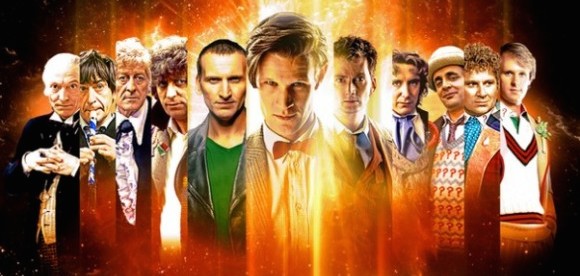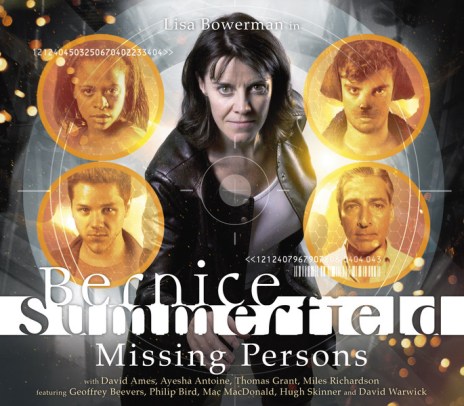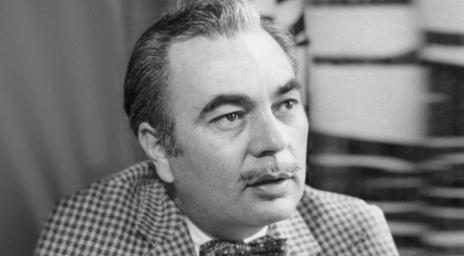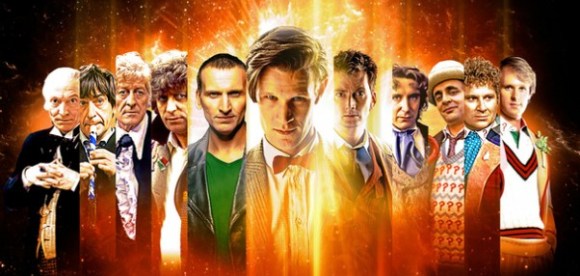What Do the Stars and Original Creator of Doctor Who Have to Say About a Female Doctor?
Essay

This past Wednesday, many of us chatted about Steven Moffat‘s remarks concerning casting a female in the titular role of Doctor Who. It seemed like a good idea to delve into the opinions of other people who have been involved in the program, as well as some of those who’ve played the Time Lord hero who makes a habit of transforming his body in order to avoid death.
The idea of a female Doctor has been explored in non-canon comedy stories. Joanna Lumley played a female Fourteenth Doctor in a Red Nose Special in 1999, “The Curse of Fatal Death,” written by Moffat. The 2003 audio play Exile featured an alternate universe where the Third Doctor was female, played by Arabella Weir. David Tennant appeared in the same audio play as another Time Lord.
Some have said that the debate about whether or not a woman can play the Doctor rose above the level of occasional fan musings due to Tom Baker, who played the Fourth Doctor. In 1981 it was announced that Baker would be leaving the title role of Doctor Who after playing it for seven years. When asked during an interview about what sort of man the Fifth Doctor might be, Baker remarked: “Well, you’re making an assumption that it’s going to be a man.”
Speculation began as to whether or not the remark should be taken seriously, and it’s been reported by different sources that then-producer John Nathan-Turner encouraged such speculation in order to help publicity. We know, of course, that the Fifth Doctor was indeed male. But since then, every announcement by the BBC that the Doctor would be recast has been quickly followed by news media asking if the next incarnation would be female. In recent years, the debate has shifted from “Is it possible?” to “Why hasn’t it happened yet?”
Before the casting of the Twelfth Doctor, actor Arthur Darvill (who played traveling companion Rory Williams) eagerly suggested Dame Helen Mirren for the role. Mirren herself said she would not be right for the part but said she believed it was time the Doctor’s gender was switched. While appearing on the show Daybreak, John Barrowman (who played Captain Jack Harkness on Doctor Who and Torchwood) also supported the gender swap, saying, “Give it a whirl. If it doesn’t work… she can always regenerate back to a man.” All the way back in 2011 he asked “If Captain Jack can be an omni-sexual time agent and an assistant to the doctor, why can’t we have a female doctor?”

When I was writing my book Doctor Who: A History, I had the opportunity to talk to Lisa Bowerman. An actor, director, and photographer, she appeared in “Survival,” the last story of the classic Doctor Who program. After the show was cancelled, she became more well known to Whovians for playing the role of Prof. Bernice Surprise Summerfield. A hard-drinking, flirtatious archeologist who originally traveled with the Doctor in tie-in media, Benny thrilled readers so much that she got her own spin-off book series that included twenty-three novels. In 1999, Big Finish Productions started releasing new books featuring Benny, along with audio dramas starring Bowerman. She has now regularly played the part for fifteen years.
With that in mind, I was curious what the actor/director thought about casting a female as the Doctor. Bowerman said, “I don’t think there’s a good reason the Doctor can’t be a woman. I don’t think we should fixate on it, either. We shouldn’t cast someone just to have a woman Doctor or a black Doctor or an Asian Doctor. If it works well dramatically and it’s the right person, then, yes, why not cast that person? If it’s a woman that time, cast a woman. You’d probably lose half of fandom, as people can be very loyal to their ideas, but you have to have confidence in your conviction. If you have something appear on television, in the story, then that legitimizes it. The Doctor can be anything except—and I don’t mean this to be offensive—anything other than British in character, atmosphere and sensibility.”
Excellent points. But what do the Doctors of Doctor Who think?
Peter Davison played the Fifth Doctor on the classic program and decades later starred in a mini-episode alongside Tennant’s Tenth Doctor (who became Davison’s son-in-law a couple of years later). Davison’s daughter Georgia Moffett auditioned for the role of Rose Tyler and years later starred as Jenny in “The Doctor’s Daughter.” In a Q&A feature on the BBC America website, Peter Davison said, “I’ve never quite liked the idea of a female Doctor. I think they’ve found a perfect situation now [in the modern show] where they have the slightly faulted Doctor with all his mad genius, and you have the strong woman as the companion. I think that works very well. If you reversed it, it would be difficult because you’d have the woman as the mad genius, but is she vulnerable? And then you just have a strong man as the companion. And somehow that doesn’t work well to me.”
In July 2013 the website blastr interviewed Colin Baker, the Sixth Doctor, and asked about the possibility of a female Doctor. The actor said, “There’s absolutely no reason why it shouldn’t be female.” He then added jokingly, “If the Doctor has twelve incarnations, surely he must be in touch with his feminine side to a certain extent.”
Baker was asked about the Doctor being played by a woman again at the Radio Times Covers Party on January 28, 2014. This time he said, “There should [be a female Doctor.] It won’t happen because [the BBC] are too timid, but there should be.”
My research for Doctor Who: A History also involved an interview with Sylvester McCoy, who played the Seventh Doctor. I brought up my own opinion that I think we’re overdue to see a good and talented female taking on the Doctor’s role. McCoy responded, “I wonder sometimes if Doctor Who would lose some fans with a woman in the role. But we need more equality among the sexes because it isn’t there yet. We don’t give women enough credit. Women can be heroic in science fiction and can be intelligent, complex characters, of course. If the Doctor can change from looking like Colin Baker to looking like me and change yet again so he looks like the not-as-handsome Paul McGann, then turning into a woman doesn’t seem much stranger. It’d be interesting and they should try it.”
Eighth Doctor actor Paul McGann has said on multiple occasions that he would like to see a female Doctor and doesn’t think there’s any good reason to prevent such casting. When fans have brought up that they’re not sure Time Lords are able to swap gender, McGann has enthusiastically responded “It’s science fiction!” At the Armageddon Convention in New Zealand in 2010, he even had a suggestion for who could play the female Doctor: “Tilda Swinton as Doctor Who, can you imagine that? Tell me you wouldn’t watch that. You would. You know you would!”
Despite all this, I know that there are people who insist that it doesn’t matter what any actor, writer, director, producer or BBC Controller thinks. These folks believe that since the Doctor was created as a male then the character must stay male and that to do otherwise would go against the core of the story. But you know who didn’t think the Doctor had to be a male forever and always? Doctor Who creator Sydney Newman.

In the 1980s, BBC Controller Michael Grade attempted to cancel Doctor Who but then rescinded the decision after international fan outcry. Despite this, he was very public in saying he didn’t like the show and thought it was embarrassing. Although it had been decided (temporarily) that Doctor Who would have another chance, there was still the feeling that the show needed a serious shake-up to make it interesting and fresh again. In 1987, Grade reached out to Newman and asked for advice.
Newman wrote back with a few suggested changes, on the condition that he return as showrunner to implement them. Those suggestions included that the Doctor get two new companions who were siblings, a 12-year-old girl and an 18-year-old boy. These siblings would travel with the Doctor for a few adventures and then, just as they were getting used to him, they would witness his regeneration into a female incarnation. As had been done with previous traveling companions who stayed after an incarnation, the story would feature characters adjusting to the fact that this was the same hero they had known before, even if the outward details were new.
Michael Grade didn’t care for these changes and dismissed Newman’s suggestions. But it doesn’t change a simple fact: The creator of Doctor Who was not only OK with the idea of the Doctor being played by a woman, he was ready to have it happen in 1987.
Seems like we’re overdue.
Alan Sizzler Kistler (@SizzlerKistler) is an actor and writer who moonlights as a geek consultant and comic book historian.He is the author of Doctor Who: A History. Paul McGann is his Doctor.
Are you following The Mary Sue on Twitter, Facebook, Tumblr, Pinterest, & Google +?
Have a tip we should know? [email protected]
